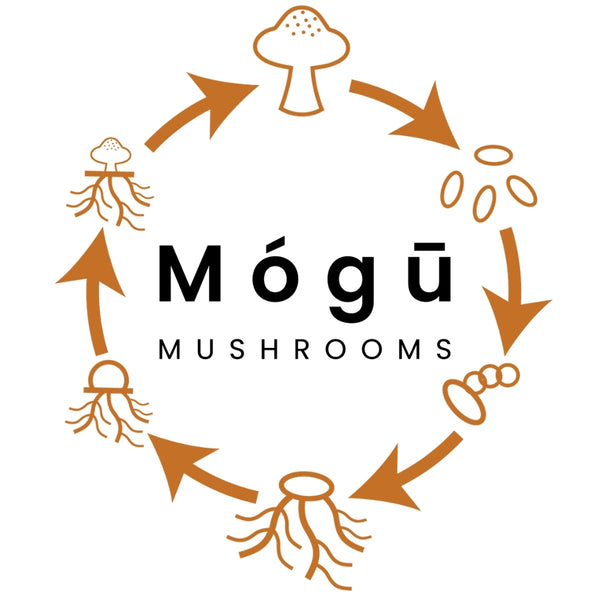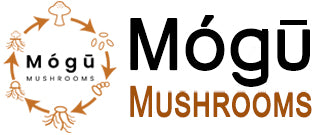Red Reishi (Ganoderma lucidum)

Reishi is known as Lingzhi in China which means "herb of spiritual potency." It is evident in Chinese medical texts that Reishi has been documented for its powerful medicinal properties for over 2,000 years now, earliest documented in Shen Nong Materia Medica for treating fatigue, asthma, cough, liver ailments, and to promote longevity. Recent reports now provide scientific support to many of the ancient claims of the health benefits of Reishi. Detailed summaries of previous studies are provided by Mógū in our section of Reishi and its Activity Against Diseases below.
Reishi mushrooms grow at the base of deciduous trees, primarily plum tree, oak, maple and hemlock trees. This fungi specie is native to China, Japan, and North America, belonging to a special class of medicines known as ‘tonic herbs’ in Traditional Chinese Medicine. Reishi is one of the most powerful adaptogens that we can find in nature, a substance that helps balance the function of the body and mind in a more harmonious way, even when we are exposed to extreme levels of stress.
The fact is, Reishi is tough and highly bitter, which means this fungi is not used for culinary purposes, but strictly for its medicinal benefits. The bitterness comes from its high content of triterpene compounds (documenting over 140 different types as we know today), which is one of the main class of compounds that makes Reishi widely used.

Active Compounds found in Reishi
| Polysaccharides, Monosaccharides, Peptidoglycans (β-D and hetero-β-glucans) exhibiting significant antitumor properties, immunomodulatory activity, antioxidant activity, and neuroprotection. |
| >140 different Triterpene compounds. Among them, more than 50 were found to be new and unique to Reishi. Vast majority are ganoderic and lucidenic acids - exhibiting cholesterol reduction, blood pressure reduction and anti-allergenic agents. |
| Oleic Acid and Cyclooctasulfur - strong inhibitors of histamine release |
| Main Mineral Elements: phosphorus, silica, sulfur, potassium, calcium, and magnesium |
| Proteins and Lectins |
| Vitamins B, D, K, A and C |
| GABA and TNF-alpha - known for its sedative effects |
| Amino Acids |
| Other myco-nutrients include: Germanium, Adenosine, Riboflavin, Ascorbic acid, Lipids, Alkaloids, Glucosides, Coumarins, Volatile oil |
 
|
Reishi and its Activity Against Diseases
Reishi has been found to alleviate symptoms in many diseases. Click a condition below to explore some of the health promoting benefits found in Reishi experiments:
- Cancer
- Immunodeficiency
- Oxidative Stress
- Viral Infections (herpes, HIV, hepatitis B)
- Bacterial Infections (including E.coli, Bacillus subtilis, Staphylococcus, Salmonella)
- Liver Disease
- Diabetes
- Kidney Disease (Nephritis, Renal ischemia, Proteinuria)
- Sleeping Disorders (Insomnia, Sleep apnea)
- Cardiovascular Disease (Hyperlipidemia, Atherosclerosis, Leukopenia)
- Rheumatoid Arthritis
- Neurasthenia (Fatigue, Depression)
- Respiratory Disease (Bronchitis, Asthma, Allergies)
- Gastrointestinal Disease (Gastric ulcers, Crohn’s disease)
- Anorexia

Unlocking the Power of Triterpenes
Animals, plants and fungi all produce triterpenes.
Recently, triterpenes have risen as a major group of secondary metabolites with important spectrum of pharmacological activities, including anti-inflammatory, anti-oxidant, antibacterial, antiviral, hepatoprotective, gastroprotective, cardioprotective, hypolipidemic, antiatherosclerotic, immunoregulatory, anticancer, and also have a role in the prevention of cancer. Different reports have described that triterpenes inhibit multiple intracellular signal molecules and transcription factors. In addition, these molecules are involved in the regulation of tumor cell proliferation, transformation, survival, invasion, angiogenesis, metastasis, chemoresistance and radioresistance.
As we can see in Medicinal Properties of Reishi above, Reishi mushrooms are highly nutritious, packed with macro nutrients and minerals. One of the star ingredients unlocking the specialties of this power herb (as well as in most medicinal mushrooms), are the triterpenes. More than 140 triterpenes have been isolated from Reishi fruiting bodies, spores and mycelia, and over 50 were found to be new and unique among Reishi mushrooms! Research studies on Reishi mainly focus in triterpenes ganoderic acids, lucidenic acids, and sterols.
Many of the positive effects against the diseases and conditions mentioned in the section Reishi and its Activity Against Diseases have direct correlation with the consumption of triterpenes from Reishi. This power unit of unsaturated hydrocarbon is one of the most exciting medicinal elements that occur in nature, especially in the world of Fungi.


